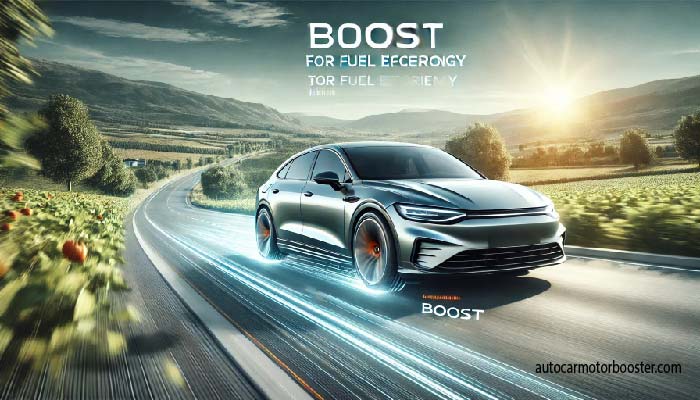In a world where fuel economy is a top priority for drivers and manufacturers alike, the concept of ‘boost’ has emerged as a key element in enhancing efficiency. As fuel prices and environmental concerns rise, drivers seek vehicles and technology that reduce fuel consumption. But how does boost improve fuel economy? This article explores the mechanics of boost technology and its impact on daily fuel usage.
What is Boost Technology?
Boost generally refers to turbocharging or supercharging in vehicles, systems designed to increase the engine’s efficiency by compressing air into the combustion chamber. More compressed air allows the engine to burn more fuel at a faster rate, producing extra power. However, boost is used strategically to avoid excessive fuel consumption, ultimately improving overall fuel economy.
How Boost Works to Improve Fuel Economy
- Increased Engine Efficiency: Boost technology allows a smaller engine to produce the same power output as a larger one. By compressing more air, smaller engines perform more efficiently, saving fuel while maintaining performance.
- Reduced Engine Load: When a vehicle has adequate boost, it doesn’t need to work as hard to accelerate. This reduces the load on the engine and prevents unnecessary fuel wastage.
- Variable Boost Control: Most modern vehicles come with boost control that adjusts according to driving conditions. By delivering power only when needed, this variable boost helps optimize fuel usage.
- Fuel Optimization at High Speeds: Turbocharged engines perform best at higher RPMs (revolutions per minute). This is beneficial on highways or open roads, where consistent speeds allow for better fuel management.
- Less Fuel Waste: Boost helps in creating a balance between power and fuel consumption. The engine only utilizes the boost when absolutely required, such as during rapid acceleration, minimizing fuel wastage during regular driving.
Advantages of Using Boost for Daily Driving
Using boost in everyday driving routines provides several notable benefits:
- Improved Fuel Efficiency: A boosted engine is generally more efficient than its naturally aspirated counterparts.
- Better Acceleration: Boost allows for quick acceleration, reducing the need for heavy throttle input.
- Enhanced Engine Longevity: With optimized fuel use, engines experience less stress, leading to a longer lifespan.
- Reduced Emissions: When engines work efficiently, carbon emissions are minimized, which is beneficial for the environment.
The Types of Boost Systems
There are two primary types of boost systems: turbochargers and superchargers.
- Turbochargers: These use exhaust gases to drive a turbine that compresses air for the engine. Turbocharging is highly effective in improving fuel economy.
- Superchargers: Unlike turbos, superchargers are connected directly to the engine and offer immediate power. Though less efficient than turbos, they still help in enhancing engine performance.
Challenges of Boost Technology in Fuel Economy
While boost is effective, certain challenges exist:
- Higher Maintenance Costs: Boosted engines, especially turbocharged engines, require specific maintenance routines.
- Fuel Quality Dependency: Some boost systems require high-octane fuel for optimal performance, which may increase fuel costs.
- Potential Overuse: If overused, boost can lead to increased fuel consumption rather than savings.
Tips for Maximizing Fuel Economy with Boost
To take full advantage of boost while maintaining fuel economy, consider the following tips:
- Use Boost Sparingly: Only activate boost when necessary, such as during acceleration.
- Maintain Consistent Speeds: Boosted engines perform best at stable speeds.
- Regular Engine Maintenance: Keeping the boost system and engine well-maintained helps prevent excessive fuel use.
- Opt for Quality Fuel: For optimal fuel economy, use the recommended fuel grade for your vehicle.
FAQs on Boost and Fuel Economy
- What is boost, and how does it help fuel economy?
Boost refers to technologies like turbocharging and supercharging that increase engine efficiency, allowing for better fuel economy by providing more power with less fuel. - Can boost technology harm the engine?
When used correctly, boost doesn’t harm the engine. However, improper use or lack of maintenance can lead to issues. - Is it possible to use boost in city driving?
Yes, but using boost in stop-and-go traffic is generally less fuel-efficient. Boost is most beneficial at higher speeds. - Does boost require a specific type of fuel?
Many boosted engines perform best with premium fuel, which may improve fuel economy but can also be more costly. - How can I maximize fuel economy with boost?
Consistent driving, regular maintenance, and using boost only when necessary will help maximize fuel efficiency in boosted engines.
By understanding how boost technology impacts fuel economy and using it effectively, drivers can enjoy the best of both power and efficiency in their daily drives. Embrace the benefits of boost to make each journey more fuel-efficient, contributing to savings and a more environmentally conscious driving experience.
If Like This Article Visit Our Website. Collect From Wekiapedia
